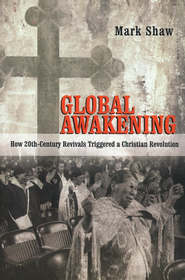Global Awakening
 Mark Shaw, Global Awakening: How 20th-Century Revivals Triggered a Christian Revolution (Downers Grove, IL: IVP Academic, 2010), 221 pages, ISBN 9780830838776.
Mark Shaw, Global Awakening: How 20th-Century Revivals Triggered a Christian Revolution (Downers Grove, IL: IVP Academic, 2010), 221 pages, ISBN 9780830838776.
This book by Mark Shaw is a welcome contribution to the study of world Christianity. His innovative thesis is that global revivals are the primary delivery system of religious change in the modern world. Several forces contribute to the new face of world Christianity, including globalization, the modern missions movement, translation of the Scriptures, and the empowerment of indigenous peoples. Through theoretical analysis and case studies, Shaw maintains that these forces are not the product of American folk ritual or the Western religious right, but belong to worldwide “charismatic people movements that transform their world by translating Christian truth and transferring power” (p 16).
Shaw claims that the rise of new world Christianity is the product of indigenous movements working “from below” (p 29). These movements emerge from a combination of spiritual, cultural, historical, group, and global dynamics. Each chapter is devoted to a separate case study, examining the dynamics of global revivals in light of particular movements. Shaw begins with the Great Korean Revival of 1907. Through local leadership, the Korean revival transformed secular imports—an alien commerce, culture, and religion—into a new, indigenous expression of Christianity (chapter 2). In chapter 3, Shaw examines the Nigerian revival of 1930 in light of cultural dynamics. Inundated by the perils of influenza, war, plague, and economic depression, Nigerians transferred their trust from science and witchcraft to “new light” indigenous leadership (p 65). The Dornakal revival in India provides an example of the role of conversion in revival (chapter 4). East African revivals illustrate the spiritual dynamic of radical community, which freed historic churches in Uganda from British colonialism and brought renewal to existing Protestant groups (chapter 5). Chapter 6 examines the North American post-war evangelical revivals. Bolstered by the soaring Pentecostal movement, leaders such as Billy Graham, John Stott, and Samuel Escobar, challenged the forces of communism and religious fundamentalism. The “Lausanne Covenant” (1974) paved the way to an international evangelicalism.
Category: Ministry, Summer 2013


